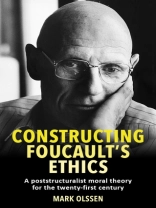In popularizing the term ‘speaking truth to power’, now widely used throughout the world, Michel Foucault established the basis upon which a new ethics can be constructed. This is the thesis that Mark Olssen advances in
Constructing Foucault’s ethics. Olssen not only ‘speaks truth’ to existing moral and ethical theories that have dominated western philosophy since Plato, but also shows how, by using Foucault’s insights, an alternative ethical and moral theory can be established that both avoids the pitfalls of postmodern relativism and simultaneously grounds ethical, moral, and political discourse for the present age. Taking the late ‘ethical turn’ in the philosopher’s thought as its starting point, this ambitious study seeks to construct an ethics beyond anything Foucault ever attempted while remaining consistent with his core postulates. In doing so it advances the concept of ‘life continuance’, which expresses a normative orientation to the future in terms of the quest for survival and well-being, giving rise to irreducible normative values as part of the discursive order of events. This approach is explored in contrast with a range of other, established systems, from the Kantian to the Marxist to contract ethics and utilitarianism.
Daftar Isi
Introduction 1 Foucault and normativity 2 Life and error: Foucault, Canguilhem, Jacob 3 Nietzsche’s life philosophy: naturalism, will to power, normativity 4 Continuance ethics, objectivity, Kant 5 Foucault, Hegel, Marx 6 Hobbes, God, and modern social contract theory 7 A politics of pluralism 8 Democracy, education, global ethics 9 Ethical Comportment Index
Tentang Penulis
Mark Olssen is Emeritus Professor of Political Theory and Higher Education Policy in the Department of Politics at the University of Surrey












